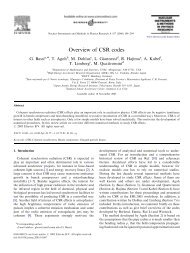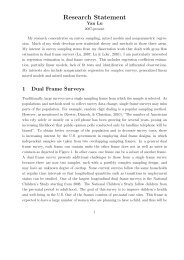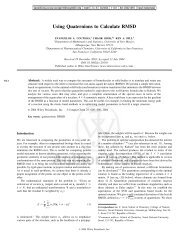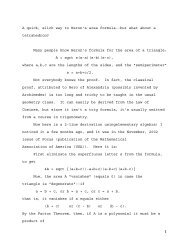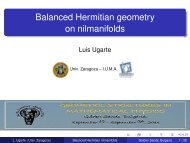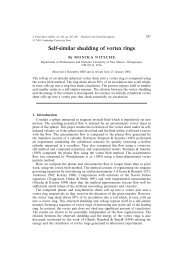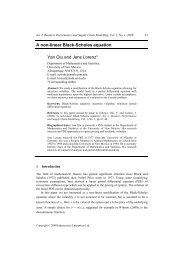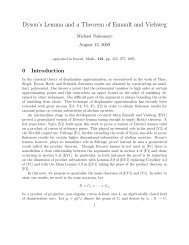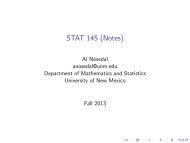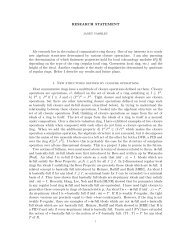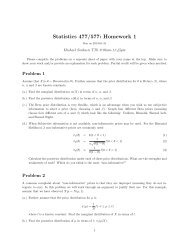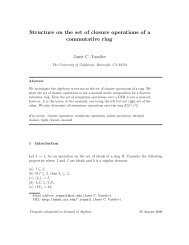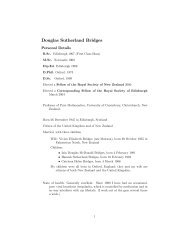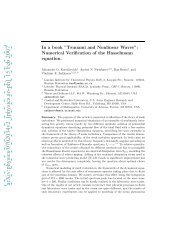OEO Office of Equal Opportunity - Department of Mathematics and ...
OEO Office of Equal Opportunity - Department of Mathematics and ...
OEO Office of Equal Opportunity - Department of Mathematics and ...
Create successful ePaper yourself
Turn your PDF publications into a flip-book with our unique Google optimized e-Paper software.
234 ARTS AND SCIENCES<br />
minimum <strong>of</strong> 57 hours <strong>and</strong> a maximum <strong>of</strong> 72 hours past the<br />
Bachelor’s, depending on the number <strong>of</strong> waivers granted<br />
by ASM for core requirements. Competency in Spanish or<br />
Portuguese is required for admission to the dual degree.<br />
Applicants must meet entrance requirements for both programs;<br />
applications should be submitted simultaneously to<br />
both programs.<br />
In order to meet the MBA requirements, a student must complete<br />
48 credit hours <strong>of</strong> study, unless the student is eligible to<br />
waive some <strong>of</strong> the courses. If waivers are granted by ASM, a<br />
total <strong>of</strong> 33 credit hours must be completed. MBA core requirements<br />
include MGT 501, 502, 504, 506, 508, 511, 520, 522,<br />
526, 598. Students must complete 30 hours <strong>of</strong> core courses<br />
or be waived from these courses (with the exception <strong>of</strong> MGT<br />
598). Students must also complete 18 hours <strong>of</strong> elective<br />
management courses.<br />
For the Latin American Studies component, students are<br />
required to complete 24 credit hours, including a minimum<br />
<strong>of</strong> 9 hours in each <strong>of</strong> two areas <strong>of</strong> concentration chosen<br />
from the following: Anthropology (with an emphasis in either<br />
Archaeology, Ethnology, or Human Evolutionary Ecology),<br />
Art History, Brazilian Literature & Culture, Community &<br />
Regional Planning, Economics, Gender Studies, History (with<br />
an emphasis in either Latin America To 1810 or Latin America<br />
Since 1810), Human Rights, International Management,<br />
Political Science, Religion & Philosophy, Sociology, Spanish<br />
American Literature, <strong>and</strong> Spanish Linguistics. See concentration/emphases<br />
requirements listed under M.A. in Latin<br />
American Studies (MALAS). The combination <strong>of</strong> areas must<br />
ensure that the program is interdisciplinary. For example,<br />
students selecting History with an emphasis in Latin America<br />
To 1810 as one concentration may not select History with an<br />
emphasis in Latin America Since 1810 as the second concentration.<br />
Students also are required to have no more than one<br />
interdisciplinary concentration. For example, a student may<br />
not choose both Human Rights <strong>and</strong> Gender Studies. The<br />
remaining 6 hours may be used for thesis (under Plan I) or<br />
electives (under Plan II).<br />
Under Plan I, students are required to present an oral<br />
defense <strong>of</strong> the thesis before a thesis committee composed <strong>of</strong><br />
at least two faculty members in one area <strong>of</strong> concentration <strong>and</strong><br />
one faculty member from the second area <strong>of</strong> concentration.<br />
Students also are required to sit for the comprehensive examination<br />
in the second area <strong>of</strong> concentration, administered by<br />
three faculty members from that concentration. Under Plan II,<br />
students are required to sit for the comprehensive examinations<br />
in both areas <strong>of</strong> concentration. The examinations are<br />
administered by a Committee on Studies composed <strong>of</strong> two<br />
faculty members from each concentration.<br />
Under both Plans I <strong>and</strong> II, students must complete a minimum<br />
<strong>of</strong> 6 credits in graduate seminars numbered 500 or above<br />
(excluding 551 or 552 Problems courses). Students should<br />
consult with the Academic Advisor to determine which<br />
courses are considered seminars.<br />
MALAS/MCRP: The joint master’s program in Latin American<br />
Studies <strong>and</strong> Community & Regional Planning is designed for<br />
students who are interested in the pr<strong>of</strong>essional practice <strong>of</strong><br />
planning in a Latin American context.<br />
The Community & Regional Planning Program at the<br />
University <strong>of</strong> New Mexico is dedicated to planning <strong>and</strong> advocating<br />
for sustainable communities <strong>and</strong> ecosystems throughout<br />
the Southwest region <strong>and</strong> Latin America. MALAS/MCRP<br />
graduates possess the knowledge <strong>and</strong> skills necessary to<br />
support planning by diverse human communities throughout<br />
the Western Hemisphere. MALAS/MCRP students learn to<br />
assist Latin American communities to create communitybased<br />
plans <strong>and</strong> programs that sustain <strong>and</strong> enhance their<br />
culture, resource base, built environment <strong>and</strong> economic<br />
vitality. The program promotes participatory processes that<br />
respond to community identities <strong>and</strong> development needs.<br />
Prerequisites to the program are competence in either<br />
Spanish or Portuguese (at least two years <strong>of</strong> undergraduate<br />
course work or equivalent language training) <strong>and</strong> basic<br />
course work in economics (micro <strong>and</strong>/or macro) <strong>and</strong> statistics.<br />
Deficit courses in economics <strong>and</strong> statistics may be made<br />
up after admission to the program.<br />
The program requires a minimum <strong>of</strong> 54 hours <strong>of</strong> graduate<br />
credit (compared to 72 hours if the two degrees were pursued<br />
separately). The required graduate credit hours include: 1)<br />
CRP 578, a 3 credit hour bridge seminar; 2) 27 credit hours<br />
<strong>of</strong> course work <strong>and</strong> thesis in Community & Regional Planning;<br />
<strong>and</strong> 3) 24 credit hours <strong>of</strong> course work in Latin American<br />
Studies. For the 27 credit hours in Community & Regional<br />
Planning, students must complete CRP 500, 510, 511, 521,<br />
545 (or 580), 588, <strong>and</strong> 599. For the 24 credits hours in Latin<br />
American Studies, students must complete a minimum <strong>of</strong><br />
9 hours in each <strong>of</strong> two areas <strong>of</strong> concentration chosen from<br />
the following: Anthropology (with an emphasis in either<br />
Archaeology, Ethnology, or Human Evolutionary Ecology),<br />
Art History, Brazilian Literature & Culture, Community &<br />
Regional Planning, Economics, Gender Studies, History (with<br />
an emphasis in either Latin America To 1810 or Latin America<br />
Since 1810), Human Rights, International Management,<br />
Political Science, Religion & Philosophy, Sociology, Spanish<br />
American Literature, <strong>and</strong> Spanish Linguistics. See concentration/emphases<br />
requirements listed under M.A. in Latin<br />
American Studies (MALAS). The combination <strong>of</strong> areas must<br />
ensure that the program is interdisciplinary. For example,<br />
students selecting History with an emphasis in Latin America<br />
To 1810 as one concentration may not select History with an<br />
emphasis in Latin America Since 1810 as the second concentration.<br />
Students also are required to have no more than<br />
one interdisciplinary concentration. For example, a student<br />
may not choose both Human Rights <strong>and</strong> Gender Studies.<br />
Each c<strong>and</strong>idate is required to prepare a thesis (Plan I). The<br />
Master’s examination will consist <strong>of</strong> an oral examination<br />
at the final presentation <strong>of</strong> the thesis; this examination will<br />
include coverage <strong>of</strong> the student’s two areas <strong>of</strong> concentration<br />
in Latin American Studies. The student’s Committee on<br />
Studies, comprised <strong>of</strong> at least two faculty members in one<br />
area <strong>of</strong> concentration <strong>and</strong> one faculty member from the second<br />
area <strong>of</strong> concentration, preside over the examination.<br />
Students must complete a minimum <strong>of</strong> 6 credits in graduate<br />
seminars numbered 500 or above (excluding 551 or<br />
552 Problems courses). Students should consult with the<br />
Academic Advisor to determine which courses are considered<br />
seminars.<br />
MALAS/MSN: The Latin American Studies Program <strong>and</strong> the<br />
College <strong>of</strong> Nursing <strong>of</strong>fer a dual graduate degree program<br />
leading to a Master <strong>of</strong> Arts in Latin American Studies <strong>and</strong> a<br />
Master <strong>of</strong> Science in Nursing. The program prepares nurses<br />
for leadership roles in health care delivery systems serving<br />
populations in Latin American countries or Hispanic populations<br />
within the United States. Students must select a concentration<br />
within Nursing <strong>and</strong> two concentrations within Latin<br />
American Studies. The program <strong>of</strong>fers both the thesis option<br />
(requiring 53 graduate credit hours) <strong>and</strong> the non-thesis option<br />
(requiring 56 graduate credit hours). The program requires<br />
two to three years <strong>of</strong> full-time study including summers for<br />
completion. Students may also complete the program on a<br />
part time basis but are required to complete all course work<br />
within the university’s seven-year limit. Prerequisites to the<br />
program are competence in either Spanish or Portuguese (at<br />
least two years <strong>of</strong> undergraduate course work or equivalent<br />
language training).<br />
The program requires a minimum <strong>of</strong> 20 credit hours in<br />
Nursing courses <strong>and</strong> 20 credit hours in Latin American<br />
Studies courses, plus 13 additional cross-counted hours<br />
under Plan I (thesis option) or 16 hours under Plan II (nonthesis<br />
option).<br />
The 20 credit hours <strong>of</strong> Nursing must include the following<br />
core courses: Nursing 501, 503, 505 <strong>and</strong> 511. Additional<br />
credit hours (depending on the area) will be required in one <strong>of</strong><br />
the following concentrations: Acute Care Nurse Practitioner,<br />
Clinical Nurse Specialist, Community Health, Family Nurse<br />
Practitioner, Nursing Administration, <strong>and</strong> Nursing Education.<br />
UNM CATALOG 2006–2007 Symbols, page 611.



